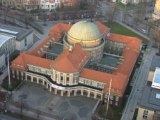
University of Hamburg
Overview
University
A university is an institution of higher education and research, which grants academic degrees in a variety of subjects. A university is an organisation that provides both undergraduate education and postgraduate education...
in Hamburg
Hamburg
-History:The first historic name for the city was, according to Claudius Ptolemy's reports, Treva.But the city takes its modern name, Hamburg, from the first permanent building on the site, a castle whose construction was ordered by the Emperor Charlemagne in AD 808...
, Germany. It was founded on 28 March 1919 by Wilhelm Stern and others. It grew out of the previous Allgemeines Vorlesungswesen and the Kolonialinstitut (Colonial Institute) as well as the Akademisches Gymnasium. There are around 38,000 students as of the start of 2006. In spite of its relatively short history, 6 Nobel Prize Winners and serials of scholars are affiliated to the University.
The annual recruitment of about 7,000 freshmen contributes to the current total of 38,000 students, of which every year 3,500 graduate and 900 receive doctoral degrees.
Unanswered Questions

